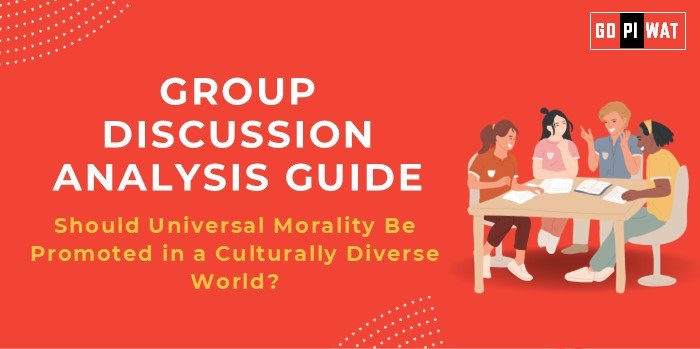📋 Group Discussion Analysis Guide: Should Universal Morality Be Promoted in a Culturally Diverse World?
🌐 Introduction to Universal Morality
Opening Context: “In an increasingly interconnected world, the tension between cultural relativism and universal morality sparks complex ethical debates.”
Topic Background: The concept of universal morality—principles considered to apply to all humans irrespective of cultural, religious, or social differences—has evolved alongside global challenges like human rights violations and climate change.
📊 Quick Facts and Key Statistics
- 📜 UN Human Rights Declaration Adoption (1948): Marks the first attempt to codify universal ethical principles globally.
- 🌏 Global Indigenous Cultures: Over 5,000 communities with unique moral systems, highlighting the challenge of ethical universality.
- ⚡ Cultural Value Clashes: 78% of surveyed nations report conflicts over moral practices (Pew Research, 2023).
🤝 Stakeholders and Their Roles
- 🏛️ Governments: Craft policies that balance international ethics with local traditions.
- 🌐 Cultural Communities: Preserve and advocate for indigenous values.
- 🌍 Global Organizations (UN, WHO): Promote universal rights through frameworks like SDGs.
- 📚 Academia & Think Tanks: Drive discourse on moral philosophy and its implications.
🏆 Achievements and Challenges
✨ Achievements
- 🌍 Universal Human Rights Frameworks: Reducing global inequalities.
- 🩺 Ethical Progress: Advances in health care and climate action through global consensus.
- 🌈 Cultural Integration: Successful examples in multicultural societies (e.g., Canada).
⚠️ Challenges
- ⚔️ Clashes Between Norms: Conflicts between religious norms and international ethics (e.g., LGBTQ+ rights).
- ❗ Implicit Moral Imperialism: Risks of undermining local traditions.
- 📢 Cultural Sovereignty Resistance: Pushback from governments citing local autonomy.
🌍 Global Comparisons
Sweden: Champion of universal ethics; progressive in gender equality.
Saudi Arabia: Cultural norms often conflict with universal ethical standards.
📄 Structured Arguments for Discussion
- ✅ Supporting Stance: “Universal morality is essential for addressing global challenges like human trafficking and climate change.”
- ❌ Opposing Stance: “Imposing universal ethics risks erasing cultural diversity and autonomy.”
- ⚖️ Balanced Perspective: “Universal ethics should complement, not replace, cultural values, ensuring mutual respect.”
🎯 Effective Discussion Approaches
- Opening Approaches:
- 📚 Cite a global issue resolved by universal ethics (e.g., the abolition of apartheid).
- 💬 Start with a quote from a philosopher like Kant or Rawls.
- Counter-Argument Handling:
- ✅ Present data showing coexistence of universal ethics and cultural preservation (e.g., Japan’s blend of tradition and modernity).
📊 Strategic Analysis: SWOT
- 💪 Strengths: Ethical consistency in global governance.
- 📉 Weaknesses: Potential loss of cultural identity.
- 🚀 Opportunities: Greater global unity and collaboration.
- ⚡ Threats: Risks of ethical imperialism and cultural erosion.
📈 Connecting with B-School Applications
- 🌐 Real-World Applications: Ethical decision-making in business, global governance models.
- 🗣️ Sample Interview Questions:
- 💬 “How can businesses respect cultural values while adhering to global ethical standards?”
- ⚖️ “What role should ethics play in international negotiations?”
- 🎓 Insights for Students:
- The interplay of cultural diversity and ethics in organizational strategy.
- Case studies in CSR demonstrating universal ethical success.


